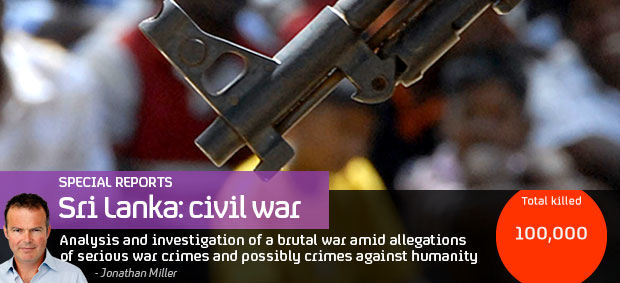Commonwealth’s Sharma defends Sri Lanka summit
The general-secretary of the Commonwealth defends the heads of government meeting that begins in Sri Lanka next week, despite allegations of appalling human rights violations.
The Sri Lankan government stands accused of unconstitutionally firing its chief justice, of grave human rights violations against Tamil citizens at the end of its civil war in 2009 including the killing of civilians, and of ongoing disappearances and torture.
Nevertheless, next week the country’s president, Mahindra Rajapaksa – himself accused of war crimes – will shake hands with Commonwealth leaders as his country is given a global platform.
Kamalesh Sharma, the secretary-general of the Commonwealth, was grilled by Jon Snow (see video above, or full interview below) on the decision to allow the heads of government meeting (CHOGM) to go ahead in Colombo, despite legal advice to the contrary and despite evidence of major human rights violations committed at the end of Sri Lanka’s civil war, as revealed by Channel 4 News.
Charter contravention
The summit is the first to be held since the signing of the Commonwealth charter, which enshrined in it values such as the upholding of democracy, and the protection of human rights.
“And yet Sri Lanka is in contravention of just about every single one of those statements,” Jon Snow put to Mr Sharma.
Mr Sharma defended the Colombo summit, saying the decision was one made by various heads of government, not by the secretary general.
In the time to come, I trust that people will see… that indeed very significant advances have been made in the interests of the people of Sri Lanka. Kamalesh Sharma
“It is not really the decision of the secretary-general,” he said. “Over the last six years, on three occasions the heads of met to discuss this request, from Sri Lanka, to hold the summit.”
It was put to Mr Sharma that he knew that Sri Lanka President Mahindra Rajapaksa had fired his chief justice – and that Mr Sharma had received legal advice that said that this was a contravention of the Commonwealth charter.
However this information was not made available to a group of eight Commonwealth ministers who verify if countries are obeying the Commonwealth charter. Asked why this legal opinion had not been passed on, Mr Sharma said it was something that had been gained “in confidence”.
Mr Sharma insisted that the Commonwealth has been making progress to address human rights issues for the people of Sri Lanka, including addressing torture and reconciliation of the two sides in Sri Lanka’s bloody civil war.
However, he said addressing whether or not the military committed grave human rights atrocities in the closing stages of the war, including allegations over the killing of civilians and summary executions, was a matter for the United Nations.
Read more from Jon Snow: A dimly lit Sri lankan affair, in a side street beneath the UN
“In the time to come, I trust that people will see… that indeed very significant advances have been made in the interests of the people of Sri Lanka,” he said.
CHOGM begins on the 10 November in Sri Lanka’s capital Colombo.
